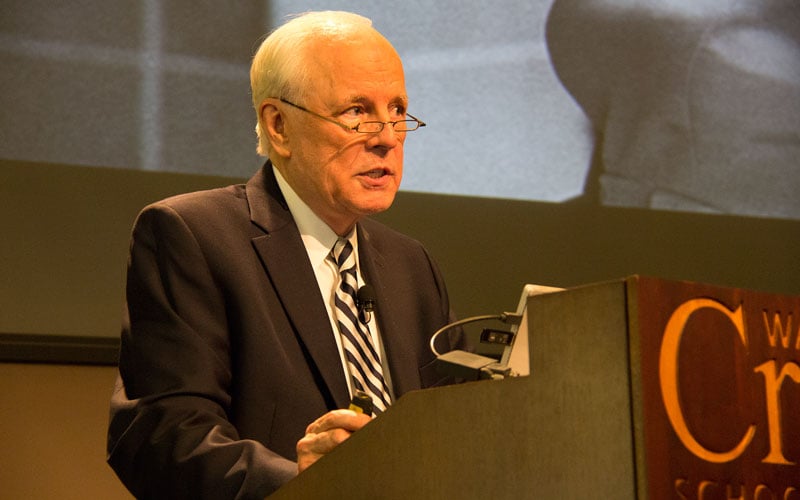
John Dean, former White House counsel in the Nixon administration, discusses the Watergate scandal and its impact on journalism during a talk Thursday at the Walter Cronkite School of Journalism and Mass Communication at Arizona State University. (Photo by Becca Smouse/Cronkite News)
It has taken decades to reveal the many sides of one of the biggest political scandals in American history: Watergate. But one former member of the Nixon White House who did time for the crime, has spent years researching the details and listening to hours of Nixon’s secret tapes to find the truth.
John W. Dean, former White House counsel to President Nixon, has since written numerous books and articles concerning the 1972 scandal in attempt to reveal what he said is the whole story.
“There are too many people out twisting and distorting history,” Dean said Thursday in a speech at the Walter Cronkite School of Journalism and Mass Communication. “It’s time to get the facts.”
On June 17, 1972, five men were caught breaking into the Democratic National Committee headquarters at the Watergate office complex in Washington D.C. The men were dressed in business suits and surgical gloves with crisp $100 bills and bugging equipment on-hand.
It was actually the second break in at the DNC, Dean said. The group was going back in to move the listening device to a better location when they were caught.
Dean later learned this wasn’t the first time crimes had been committed to gather information concerning the Oval Office. Nixon himself had ordered his team to gather information to smear Daniel Ellsberg, the person who provided the Pentagon Papers to the New York Times.
John Ehrlichman, assistant to the president, approved a plan to break into Ellsberg’s psychiatrist’s office to gather information. Two of the men involved in the Ellsberg operation were also used in the Watergate break-in, according to Dean.
The first Watergate story published in the Washington Post that tied one of the men arrested to Nixon’s re-election committee included a statement by former Attorney General John N. Mitchell, the head of the committee, saying the men “were not operating either in our behalf or with our consent.”
It was at that time Dean said that he could tell a cover-up by Nixon’s staff was taking place. Dean, who served as Nixon’s counsel from 1970 to 1972, said no evidence has ever surfaced to directly connect Nixon to ordering of the bugging operation.
Dean said he was in Manila during the break-in, but was quickly brought up to speed upon his return to the U.S. the following day. Dean said there were good days and bad days while working at the White House, but “Watergate was one of the worst.”
“[The White House] wasn’t a pleasant place to work,” he said.
Although he played a role in the cover-up, Dean broke ranks with the administration and was fired by Nixon. He testified against the Nixon administration in Senate hearings and when the case went to court. He implicated himself and several members of the administration in the cover-up.
“I was in a very serious fight,” Dean said. “I knew it was going to be my word against the President of the United States.”
Dean plead guilty to obstruction of justice for his role and served four months in prison.
Before Watergate, Dean said he tried to leave the White House but was told no. “I knew I was in trouble.” #watergate
— Becca Smouse (@BeccaSmouse) October 16, 2015
“Watergate isn’t an isolated incident,” he said. “It is a mentality in the Nixon White House. It is not representative of some … crime but rather it’s a standard operating procedure.”
Dean said investigative journalism dominated the media industry for roughly a decade following Watergate. The scandal made icons of Washington Post reporters Bob Woodward and Carl Bernstein.
The frequency of political scandals would multiply exponentially in the years to come.
Dean said coverage of Watergate altered the way the presidency is covered by the media.
“Before Watergate, presidents were given the benefit of the doubt,” Dean said, citing examples of the media’s blind eye to Eisenhower’s handling of the U2 plane crash over Russia and Kennedy’s hushed affairs. In the aftermath of Watergate, confrontation has become the “norm of these press conferences,” he said.
Dean, who became an investment banker, author and lecturer after Watergate, has been named to Arizona State’s Barry Goldwater Chair of American Institutions and will teach a class in the spring of 2016 on the gritty details of the scandal. The working title of the class is “Understanding the Watergate scandal.”
“The simple question it answers is: What happened, why did it happen and what does it mean?” Dean said, adding that he has put in a vast amount of research for the class, filtering through videos and articles to include in his teachings. Dean said, to his surprise, preparing for the class has been more work than writing any of his books.
“It takes a massive amount of work,” Dean said. “I’ve been on it for months already.”